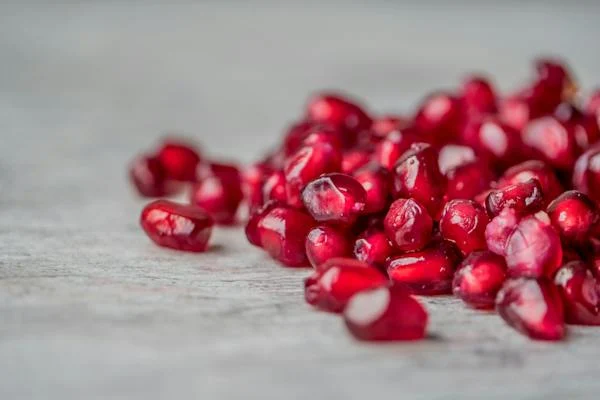Pomegranates are not only deliciously sweet and tangy but also packed with an array of health-boosting nutrients are explained in the nutrition facts of pomegranates. From their vibrant seeds to the juice that flows within, every part of this fruit offers an abundance of benefits that contribute to overall well-being.

In this article, we’ll delve into the nutrition facts of pomegranates and uncover the various ways they can positively impact your health.
Introduction
Pomegranates have been revered for centuries for their vibrant color and delightful taste. However, these fruits offer much more than just flavor. Bursting with essential nutrients, they are a nutritional powerhouse that can significantly contribute to your overall health and well-being.
Nutrition Facts of Pomegranate
Vitamins
Pomegranates are rich in a variety of vitamins, each playing a unique role in supporting bodily functions. Vitamin C, known for its immune-boosting properties, is found in abundance within these ruby-red seeds.

Additionally, pomegranates contain significant amounts of vitamin K, essential for blood clotting and bone health, and vitamin E, a potent antioxidant that supports skin health.
Minerals
Minerals are crucial for various physiological processes, and pomegranates provide several essential minerals. Potassium, which aids in maintaining healthy blood pressure, is present in pomegranates. The fruit also contains minerals like calcium and iron, contributing to bone health and oxygen transport in the blood.
Rich in Antioxidants
Pomegranates are a good source of antioxidants, including punicalagin and anthocyanins. These antioxidants combat oxidative stress in the body, protecting cells from damage and reducing the risk of chronic diseases.
Heart Health and Beyond
Cardiovascular Benefits
The compounds in pomegranates have been linked to improved heart health. They help lower bad cholesterol levels and increase good cholesterol levels, reducing the risk of heart disease. Pomegranates also promote healthy blood circulation, supporting overall cardiovascular function.

Blood Pressure Regulation
The potassium content in pomegranates contributes to regulating blood pressure levels. Including this fruit in your diet can help maintain a healthy cardiovascular system.
Anti-Inflammatory Properties
Pomegranates contain natural anti-inflammatory compounds that may help alleviate inflammation and reduce the risk of inflammatory conditions.
Digestive Support
The dietary fiber content of pomegranates supports digestive health by promoting regular bowel movements and preventing constipation. It also nurtures a healthy gut microbiome, which is essential for overall well-being.
Boosting Immunity
Vitamin C, present in abundance in pomegranates, is a potent immune system booster. Regular consumption can enhance your body’s ability to fend off infections and illnesses.
Potential Cancer-Fighting Properties
Some studies suggest that the antioxidants in pomegranates may have anti-cancer effects, particularly against breast and prostate cancers.
Aiding Weight Management
Pomegranates are low in calories and rich in fiber, making them a great addition to a weight-conscious diet.
Skin Health and Anti-Aging
The antioxidants in pomegranates contribute to healthy and youthful skin. They help protect the skin from damage caused by environmental factors and promote collagen production, reducing the appearance of wrinkles.
Incorporating Pomegranates into Your Diet
Adding pomegranates to your diet is easy and versatile. Enjoy them as a snack, sprinkle the seeds on salads or yogurt, or even use the juice in smoothies. Get creative and explore the many delicious ways to incorporate this fruit into your meals.
Pomegranate Myths and Facts
Myth: Pomegranate seeds are high in sugar and should be avoided. Fact: While pomegranate seeds do contain natural sugars, they are also rich in fiber and antioxidants, making them a healthy choice.
Myth: Pomegranates interact negatively with medications. Fact: Pomegranates can interact with certain medications, so it’s advisable to consult your doctor if you’re on medication.
Myth: Pomegranate supplements are as effective as consuming the whole fruit. Fact: Whole pomegranate offers a synergistic blend of nutrients that supplements may not fully replicate.
Myth: Pomegranates are only good for heart health. Fact: Pomegranates offer a wide range of health benefits beyond heart health, including immune support and anti-inflammatory effects.
Myth: Pomegranates have no side effects. Fact: While generally safe, some individuals may experience allergic reactions or gastrointestinal discomfort.
Conclusion
Incorporating pomegranates into your diet can be a delightful way to enhance your overall health. From supporting heart health to promoting radiant skin, the impressive array of nutrients and antioxidants found in pomegranates makes them a valuable addition to any well-balanced diet.
Access the Goodness of Pomegranates
Ready to enjoy the numerous benefits of pomegranates? Access the goodness now by incorporating this delicious and nutritious fruit into your daily routine. Explore the various ways to savor its unique flavor and unlock its health-boosting potential.
FAQs about Pomegranates
-
Can pomegranates replace medical treatment? Pomegranates are a valuable addition to a healthy lifestyle, but they are not a substitute for medical treatment. Always consult your healthcare provider for proper medical advice.
-
Are pomegranate supplements as effective as the fruit itself? While supplements may offer some benefits, the whole fruit provides a broader spectrum of nutrients that work together for optimal health.
-
Can I consume pomegranates if I have diabetes? Pomegranates can be enjoyed in moderation by individuals with diabetes, as they contain
